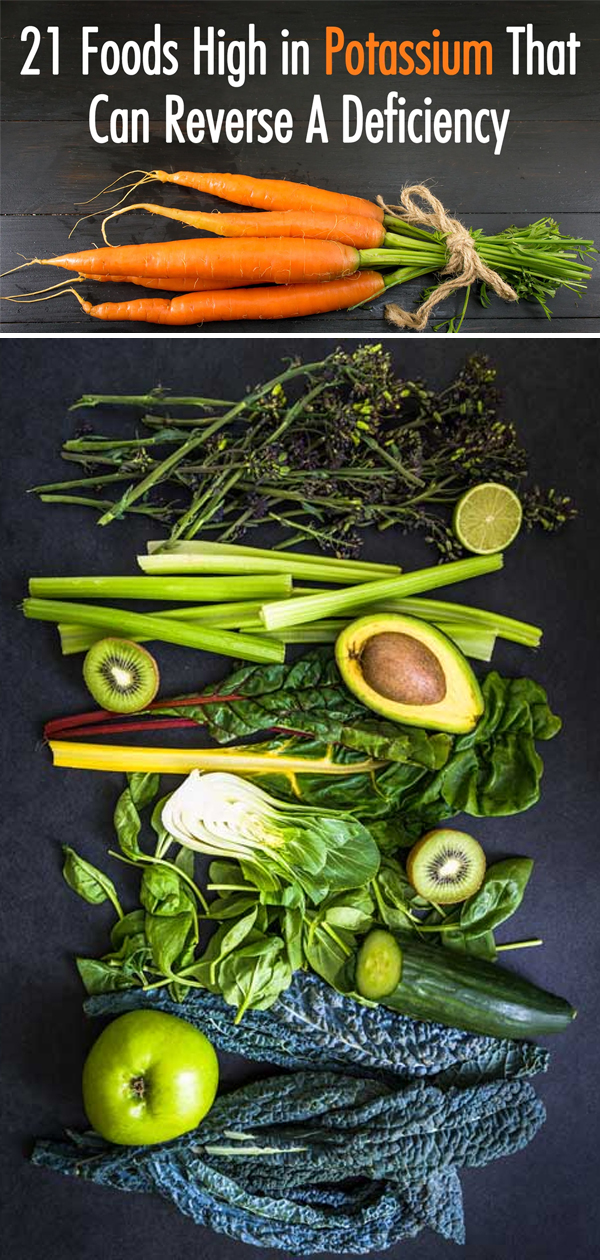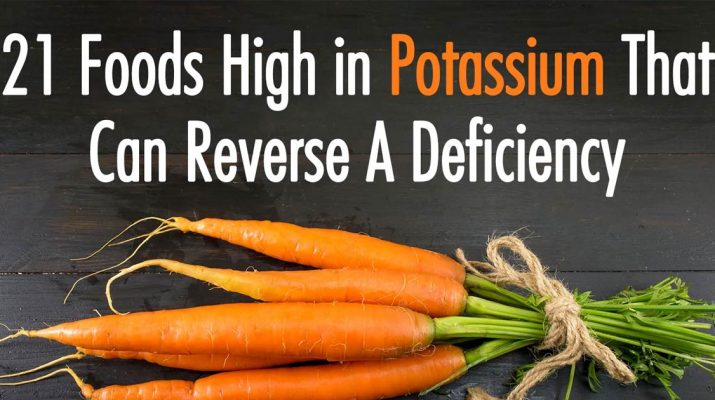Your body doesn’t produce potassium, but it’s an essential nutrient for optimal health. Most people don’t receive enough potassium in their diets, including diets centered mostly on whole, nutritious foods. It is important to eat foods high in potassium.
Why You Need Potassium
According to a national survey, 3% of Americans receive meet the country’s daily recommendation of 4,700 mg. This number is higher than other countries; however, the level is both effective and safe. If you already follow a varied diet of mostly fruits and vegetables, your potassium intake might be fine. (1)
Potassium is responsible for the balance of electrolytes and fluids in your body. Without enough potassium, your body can’t regulate hydration. Its benefits don’t stop there. It’s also a vital nutrient for protecting your kidneys, muscles, heart, and brain.
Symptoms Of Hypokalemia (Low Potassium)
• Severe headaches
• Swollen glands
• Swollen tissues
• Water retention
• Heart palpitations
• Muscle fatigue
• Muscle cramps
If hypokalemia goes untreated, it can lead to a heart attack. (3)
Who’s At Risk?
Pregnant Women
Some pregnant women will have hyperemesis gravidarum, which is a severe form of morning sickness. These women are at the highest risk of potassium deficiency and severe dehydration if they don’t seek treatment and IV fluids.
Severe Vomiting And Diarrhea
Whether you had a bout of stomach flu or food poisoning, you should be concerned about your potassium levels.
Heart Conditions
Because potassium is crucial to your heart’s health, you should do your best to meet the minimum requirements. Not only does it protect your heart, but you’re already at a greater risk of future heart complications.
Athletes And Exercise Junkies
Exercise is great for the body. Sports are no different. Even if you’re maintaining your hydration, when you sweat, you’re depleting your body of potassium. Water alone isn’t enough to restore it, and sugary sports drinks aren’t doing your body any favors.
Everyone Else
Sickness, heart conditions, and pregnancy aren’t the only times you need to worry about your potassium intake. Because of the Standard American Diet (SAD) and increased salt intake, the average person is at risk for a potassium deficiency. If we look at the survey again, we’ll find 96% of the people don’t meet the bare minimum requirements through their diets.
Food Plays A Major Role In Low Potassium
A major cause of low potassium is our food choices and preparation methods. We take healthy foods (hello, french fries) and turn them into silent killers. An occasional french fry or unhealthy treat is fine. Celebration and guiltless little cheats can be good for your mental health and keep you on track.
However, when those seemingly harmless treats become your everyday fare, you’re hurting your body in ways you can’t see. You might not see the effects of heart palpitations, the damage to kidneys, or the heart attack until years of suffering with otherwise unknown headaches, fatigue, and cramps.
If you’re not eating enough foods high in potassium, you’re not receiving what your body needs to properly function.
Watch Your Salt
Salt is another component of the low potassium problem. Now, salt itself isn’t a villain. Sea salt, Himalayan salt, and other natural salts are essential nutrients too. Copious amounts of table salt isn’t. Table salt upsets the balance and depletes our bodies of potassium.
Even if you consume foods high in potassium, if you’re using too much table salt, you’re unlikely to rebuild your stores.
Where To Find Potassium
Foods high in potassium grow in abundance. You will find them at the farmer’s market. They’re sold in the supermarket. Best of all? The potassium-rich foods on the list aren’t anything crazy or strange.
Yes, you can also supplement for potassium. This shouldn’t be a long term solution without the guidance of your doctor, nutritionist, or naturopath. Requiring a supplement isn’t necessary for the majority of people, but some medical conditions and medications will require them.
Side Effects And Concerns
If you receive all your potassium from foods, you’re unlikely to be at risk for an overdose. However, an imbalance between potassium can occur in the high range too. Routine blood work can detect early signs, as mild symptoms usually go unnoticed. Here are 21 foods high in potassium.
21 Foods High In Potassium
1. Bananas
Few people dislike bananas. It’s a portable food. You can use it in many sweet recipes and smoothies. It can be a snack, a breakfast, a topping, or dessert by itself. At 422 mg per medium banana, it makes perfect sense to sit at the top of our list.
2. Sweet Potatoes
One cup of cubed sweet potatoes (or medium sized, whole) will grant you 448 mg of potassium. This healthy, versatile root vegetable makes a wonderful addition to many meals. It’s also inexpensive.
3. Red Pepper
Whether you prefer a red bell pepper or a spicy Serrano, you’ll find about 100 mg per serving in this nutrient-rich vegetable. That might seem like a small amount compared to higher alternatives, but red peppers can be anything from a snack to a salad topper to a complimenting flavor in a tasty recipe. So 100 mg is a lot when you think of it that way.
4. Carrots
Carrots are like nature’s candy. They’re sweet, but they lend well to savory dishes. Eat them plain or dipped in a heart healthy nut butter, and you’ll receive 410 mg of potassium.
5. Avocado
This potassium rich super-food weighs in at 708 mg of potassium in each cup, so go ahead and dip your carrots, red peppers, and broccoli in heart and kidney friendly guacamole.
6. Oranges
Need a little sweet snack? Reach for a cup of orange segments for 326 mg of potassium.
7. Kiwi
Everyone’s favorite fuzzy fruit has another trick up its sleeve. A single 1 cup serving yields 562 mg of potassium and 278% of your Vitamin C RDI.
8. Steak
Not crazy about fruits and vegetables? Are you low carb, Paleo, or keto? A serving of sirloin steak offers you 629 mg of potassium. Beef of any kind will offer similar benefits.
9. Sardines
Generic sardines packed in oil clock in at 592 mg of potassium for a single cup. Some name brands have less potassium per serving, so be sure to read labels.
10. Salmon
Both fresh and canned salmon will give your potassium levels a quick boost. About 487 mg hide in one serving.
11. Apricot
Do you like unsweetened dried fruits? Here’s a reason to enjoy apricots, which pair well with a cheese board or it oatmeal. Sweet and chewy, they clock in at 1,511 mg per cup.
12. Dates
Top salads, add to you homemade baked goods, stuff with cheese, or eat them plain, and you’ll reap 964 mg of potassium in a one cup serving.
18. White Potato
Okay, so we’re not talking about fried or mashed variety here. However, a healthy baked or oven roasted potato will bring you 800 mg potassium as well as fiber, iron, and vitamins C and B6.
19. Peas
Pass the peas, please. A single cup serving will yield you with 354 mg of potassium.
20. Broccoli
Raw or boiled, a serving of potassium-rich foods like broccoli will provide you with over 500 mg.
21. Spinach
We saved the best for last. Clocking in as one of the highest potassium foods is spinach with a whopping 1,897 mg in a single serving. That is over half the RDI.
Don’t feel much like Popeye? Spinach is a versatile food that hides easily in smoothies, salads, pizza toppings, and even baked casseroles.
Bonus Foods
22. Coconut Water
It’s only f air to provide athletes and exercise junkies with a healthy alternative to refuel their bodies. Opt for no added sugar varieties. A single serving provides your body with roughly 600 mg of potassium.
air to provide athletes and exercise junkies with a healthy alternative to refuel their bodies. Opt for no added sugar varieties. A single serving provides your body with roughly 600 mg of potassium.

